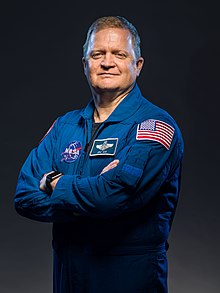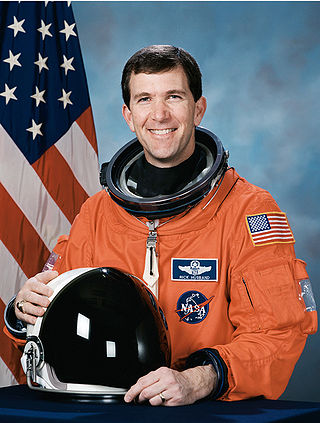
Richard Douglas Husband was an American astronaut and fighter pilot. He traveled into space twice: as pilot of STS-96 and commander of STS-107. Husband and the rest of the crew of STS-107 were killed when Columbia disintegrated during reentry into the Earth's atmosphere. He is also a recipient of the Congressional Space Medal of Honor.

John Howard Casper is a former American astronaut and retired United States Air Force pilot.
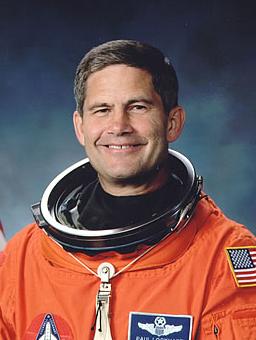
Paul Scott "Paco" Lockhart is an American aerospace engineer, retired United States Air Force colonel and NASA astronaut, a veteran of two Space Shuttle missions.

Lloyd Blaine Hammond Jr. is a Gulfstream test pilot, a former United States Air Force officer, and a former NASA astronaut. He flew on two Space Shuttle missions.

Terence Thomas "Tom" Henricks is a retired colonel in the United States Air Force and a former NASA astronaut. He served on four Space Shuttle missions.

Guy Spence Gardner is a United States Air Force officer and a former astronaut. He holds the rank of colonel. He flew as pilot on two Space Shuttle missions, STS-27 and STS-35. Gardner was also the 12th president of the Williamson College of the Trades.

Steven Wayne Lindsey is a retired U.S. Air Force officer and NASA astronaut. Lindsey served as Chief of the NASA Astronaut Office from September 2006 until October 2009.

James McNeal "Vegas" Kelly is a NASA astronaut and a retired Colonel of the United States Air Force. He twice served as pilot on Space Shuttle missions. James Kelly is not related to Scott Kelly or Mark Kelly.

Donald Ray McMonagle is a former astronaut and a veteran of three shuttle flights. He became the Manager, Launch Integration, at the Kennedy Space Center, Florida, on August 15, 1997. In this capacity he was responsible for final shuttle preparation, launch execution, and return of the orbiter to KSC following landings at any other location. He was chair of the Mission Management Team, and was the final authority for launch decision.

Mark Lewis "Roman" Polansky is an American aerospace engineer and research pilot and a former NASA astronaut. Polansky received the nickname "Roman" as a joke, because he shares a last name with director Roman Polanski. He flew on three Space Shuttle missions: STS-98, STS-116, and STS-127 and was first person of Korean ancestry in space.

Frederick Wilford "Rick" Sturckow is an engineer, retired United States Marine Corps officer, former NASA astronaut, and commercial spacecraft pilot. Sturckow is a veteran of four Space Shuttle missions. He flew as a pilot on STS-88 and STS-105 and as a commander on STS-117 and STS-128. All four missions docked with the International Space Station, making Sturckow one of three American astronauts to visit the station four times. Sturckow later was assigned to the Johnson Space Center as a CAPCOM. He left NASA in 2013 to become a pilot for Virgin Galactic.

Rex Joseph Walheim is a retired United States Air Force officer, engineer and NASA astronaut. He flew three Space Shuttle missions, STS-110, STS-122, and STS-135. Walheim logged over 566 hours in space, including 36 hours and 23 minutes of spacewalk (EVA) time. He was assigned as mission specialist and flight engineer on STS-135, the final Space Shuttle mission.

Edward Michael "Mike" Fincke is an American astronaut who formerly held the American record for the most time in space. His record was broken by Scott Kelly on October 16, 2015.
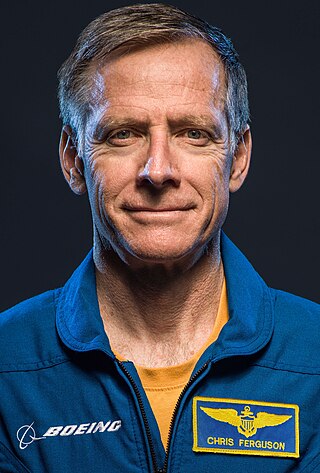
Christopher J. "Fergy" Ferguson is a Boeing commercial astronaut and a retired United States Navy captain and NASA astronaut. He was the pilot of Space Shuttle Atlantis on his first mission to space, STS-115, which launched on September 9, 2006, and returned to Earth on September 21, 2006. He then commanded STS-126 aboard Space ShuttleEndeavour. In 2011, he was assigned as commander of STS-135, which was the final mission of the space shuttle program.
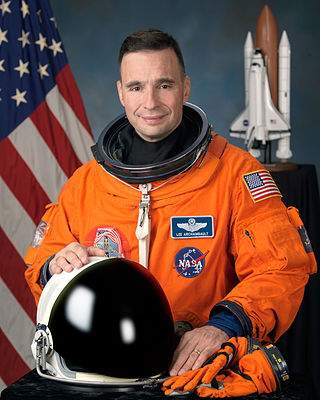
Lee Joseph "Bru" Archambault is an American test pilot and former NASA astronaut. He has logged over 4,250 flight hours in more than 30 different aircraft. Archambault is married with three children. His hobbies include bicycling, weightlifting, and playing ice hockey. Archambault has received numerous awards and honors throughout his life. He has also flown two Space Shuttle missions, as pilot of STS-117 in 2007 and as commander of STS-119 in 2009. Archambault left NASA in 2013 after a 15-year career with the agency in order to become a test pilot for Sierra Nevada Corporation on their Dream Chaser orbital spaceplane project.

James Patrick "Mash" Dutton Jr. is an engineer, former NASA astronaut pilot of the Class of 2004, and a former test pilot in the US Air Force with the rank of colonel.

Gregory Harold "Box" Johnson is a former NASA astronaut and a retired colonel in the United States Air Force. Johnson is a veteran of two space flights, STS-123 and STS-134. He served as pilot on his first mission, which delivered the Kibo logistics module and the Dextre robot arm to the International Space Station. Johnson was also assigned as the pilot to the STS-134 mission, which launched on May 16, 2011, and landed on June 1, 2011. Greg Johnson has also served in numerous roles for NASA including as a Capcom for several missions. Gregory H. Johnson was the President and executive director for the Center for the Advancement of Science in Space (CASIS) until March 10, 2018. He is now working with Lockheed Martin.

Kevin Anthony Ford is a retired United States Air Force Colonel and NASA astronaut. Ford has received a number of special honors and awards, some of which are the Air Force Meritorious Service Medal, Air Force Commendation Medal, Aerial Achievement Medal and the Armed Forces Expeditionary Medal. Ford has also logged more than 6,100 flying hours and also holds FAA certificates for airplanes, helicopters, gliders, and balloons. Ford has served in many roles at NASA since his selection in July 2000. The roles include as a Capsule Communicator or CAPCOM. He was also the Director Of Operations at the Gagarin Cosmonaut Training Center in Star City, Russia from January 2004 to January 2005. He was pilot of STS-128 and flight engineer 2 of Soyuz TMA-06M from October 23, 2012, to March 16, 2013. He served as ISS flight engineer for Expedition 33, and commander of Expedition 34.
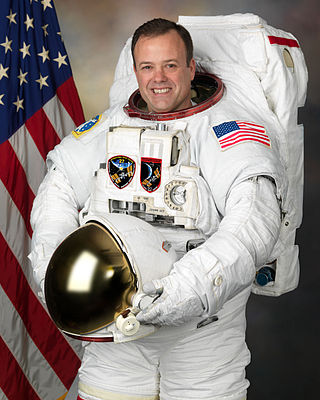
Ronald John Garan Jr. is a retired NASA astronaut. After graduating from State University of New York College at Oneonta in 1982, he joined the Air Force, becoming a Second Lieutenant in 1984. He became an F-16 pilot, and flew combat missions in Desert Shield and Desert Storm. Before becoming an astronaut he was the Operations Officer of the 40th Flight Test Squadron (FTS). He first flew in space as a mission specialist on the May 2008 STS-124 mission to the International Space Station (ISS). He returned to ISS on April 4, 2011, for a six-month stay as a member of Expedition 27. Garan is a highly decorated former NASA astronaut who flew on the US Space Shuttle, Russian Soyuz, and International Space Station. In total he spent 178 days in space and more than 71 million miles in 2,842 orbits of Earth, 27 hours and 3 minutes of EVA in four spacewalks, and 18 days on the bottom of the ocean during the NEEMO-9 undersea mission.

Michael Timothy "Bueno" Good is a retired NASA astronaut, engineer and retired commissioned officer in the United States Air Force, holding the rank of Colonel. Mike Good flew aboard Space Shuttle Atlantis for its STS-125 mission. STS-125 was the final Hubble Space Telescope servicing mission. Good flew as mission specialist 2 to the International Space Station on STS-132.
